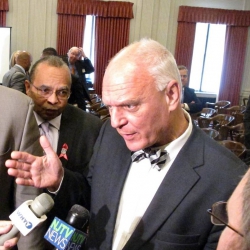The New Jersey Department of Community Affairs has rejected a recovery plan by Atlantic City. Mayor Don Guardian submitted the plan, which is designed to alleviate roughly $500 million in debt. The rejection sets the stage for the state of New Jersey to take over the Atlantic City economy.
Department spokesperson Tammori Petty said that the New Jersey Local Finance Board next must “consider whether to assume powers of the governing body that may be substantially related to the city’s fiscal condition or financial rehabilitation and recovery.”
Marty Small Vows to Fight a Takeover
Marty Small, the City Council President of Atlantic City, criticized the decision as “misinformed, misguided, and biased.”
Council President Small vowed to fight the decision and added, “The fix was in, and it will be dealt with. This is far from over.”
Guardian’s plan had the city laying off 100 employees, seeking tax settlements with the casino industry, selling a $110 million airport site, and issuing $100 million in bonds.
“Not Likely to Achieve Financial Stability”
Charles Richman, the commissioner for the New Jersey Department of Community Affairs, wrote in his opinion that those measures are not likely to help the city clear its debt. Richman’s rejection is because the plan is “not likely to achieve financial stability.”
The rejection means that Atlantic City is likely to have its finances and city government taken over by the State of New Jersey. Gov. Chris Christie wants to place Atlantic City under the state’s guidance for the next five years.
That would require massive layoffs of city personnel. New Jersey’s takeover of the city’s finances would give it resources that a city of 40,000 does not have, but it also would require local leaders and residents to face consequences they would have no control over.
Charles Richman’s Opinion
In his opinion, Richman said, “I would have much preferred to leave management of the city’s recovery in the hands of its municipal officials. However, I am constrained by the plan the city has placed before me. The enormous problems confronting the city did not occur overnight.”
“City leadership has had ample time to improve the city’s financial condition yet has avoided doing so in any meaningful way. Significantly, the city failed to take the steps necessary to implement the signature components of its plan during the past 150 days.”
Casino Industry’s Decline
The decline since 2006 has been stark, but 2014 was a watermark year for the Atlantic City economy. Four of the city’s twelve casinos closed that year, while a fifth casino (Trump Taj Mahal) went bankrupt and would linger on until it closed in October 2016.
The closure of the four casinos in 2014 cost the city 8,000 jobs. If one assumes the typical family has 2.4 people, then almost 50% of the population in a city of 40,000 was directly affected by those closures. An additional 1,000 non-gaming jobs were lost in the same year, which explains why Atlantic City was considered to have the worst local economy of any American city in 2014.
Atlantic City’s Property Taxes
The effect on the city’s finances was just as bad. Atlantic City’s casinos paid 70% of the property taxes prior to the closures, so the loss of one-third of the casinos represented a huge loss of tax revenue. The city soon was facing a budget deficit of $70,000,000 a year.
Since the city also had prior debt based on a more booming gaming economy, Atlantic City’s finances cratered. The New Jersey legislature tried several ways to save the Atlantic City economy, but it was only a matter of time before the New Jersey administration stepped in.
Late-October Deadline
The leadership of Atlantic City won a 130-day reprieve early in the summer. In the interim, Don Guardian and the city council were told they needed to prepare a plan for the city’s financial future. Late-October would be the deadline.
With the New Jersey Department of Community Affairs‘s rejection, the path seems clear for the state’s financial officers to take control of Atlantic City’s finances for the next five years. The state plan is uncertain, but a few assumptions can be made. Given the regulator’s rejection, people can look at Don Guardian’s plan and imagine that the state plan is likely to be more severe.

